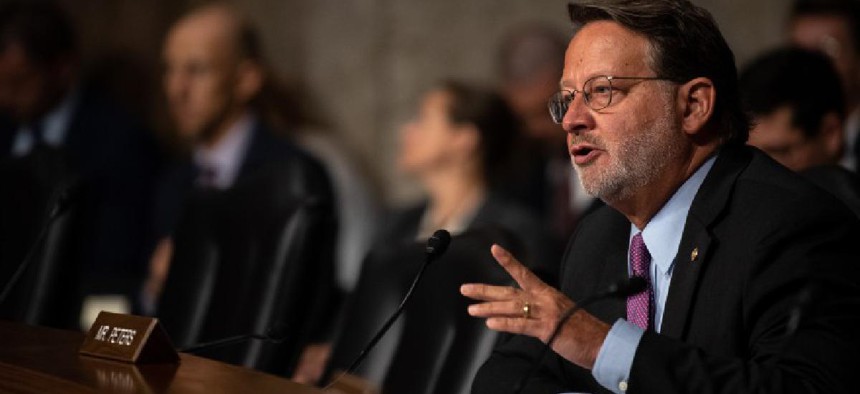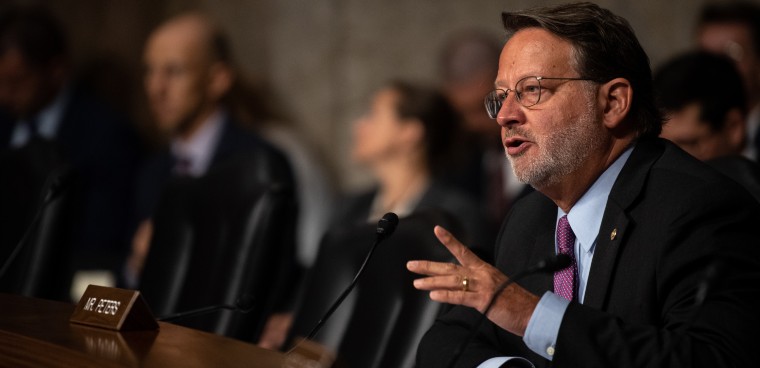Sen. Peters takes over HSGAC

The Senate Homeland Security and Government Affairs Committee will be faced with oversight responsibilities over the SolarWinds hack, the federal government's response to the pandemic and with legislation to implement the Biden administration's priorities for the federal workforce.

Sen. Peters at a 2019 hearing of the Senate Armed Services Committee (DOD photo by U.S. Army Sgt. Amber I Smith)
As the new chairman of the Homeland Security and Governmental Affairs Committee, Sen. Gary Peters (D-Mich.) faces the immediate, ongoing crises of the pandemic and the SolarWinds hack and its fallout on government agencies as well as the long-term task of oversight of the new administration's efforts to undo four years of Trump administration federal workforce policies.
As chairman, Peters has the power to direct the committee's legislative priorities and call hearings to conduct oversight of government operations, including federal contracting and the civil service. In the last Congress, he was the ranking member of the committee.
"From cyber-attacks and the rise of domestic terrorism to a deadly pandemic – there is no question that the American people continue to face persistent and pernicious threats," Peters said in a statement about his new position. "I'll continue my efforts to ensure the federal government is fulfilling its top mission to keep Americans safe."
Oversight on federal response to the pandemic has been on Peter's agenda since the outbreak began. The senator has been vocal about how agencies handled the pandemic, asking for their re-opening plans to be made public and sponsoring legislation that would have created labor-management task forces for pandemic policies in the federal workforce.
Last December, he sent letters to the White House and several departments asking for information about the federal government's pandemic response.
Peters has also been active on the cybersecurity front as a critic of former President Donald Trump's cybersecurity policies, warning that not enough was being done to protect the security of health care systems from state sponsored adversaries.
After the SolarWinds Orion hack was exposed last year, Peters and Senator Rob Portman (R-Ohio) issued a joint statement about their intentions to hold hearings and work on cybersecurity legislation.
"These types of sophisticated attacks are going to continue, and we must work across the federal government, as well as with our private sector and state and local partners, to learn from this and strengthen our cyber defenses," they wrote.
Peters also co-sponsored a bill that would have nullified the Schedule F executive order that was designed to reclassify thousands of competitive service positions to at-will employment. He was also among Democrats pushing to block the measure via the appropriations process, although those efforts did not succeed.
Federal employee unions told FCW that they are optimistic about the change in committee leadership.
Peters "understands, supports and respects the contributions of the federal workforce," said Tony Reardon, the National President of the National Treasury Employees Union. "As a senator, he has built strong relationships with the federal employees NTEU represents in the state of Michigan."
As a chairman of the committee, Peters will bring the same approach to agencies, Reardon said.
Peters follows Sen. Ron Johnson (R-Wis.), who has been chair of the committee since 2015. A supporter of former President Donald Trump, his loyalty was reflected in his actions as chairman, such as the use of his role on the committee during the first impeachment of the former president and a hearing he held on "irregularities in the 2020 election," despite the lack of evidence for significant election fraud.
Johnson generally gave a "muted response" to the issues that federal labor and affinity groups raised, although his presence was felt in the Senate confirmation process for positions on independent agencies like the Federal Labor Relations Authority and Merit Systems Protection Board, said Steve Lenkart, the executive director of the National Federation of Federal Employees.
"We expect a 100% wholesale change," he said. "We're looking forward to and certainly expect [Peters'] support to get good nominees into those tribunals, to get them up and running again."
Lenkart also hopes that Peters takes action to "repair the civil service" and "gap some of those holes" that came up over the past four years by doing things like strengthening whistleblower protections.
"Senator Peters is going to have a lot on his plate," he said.
NEXT STORY: Space Force begins onboarding cyber specialists



